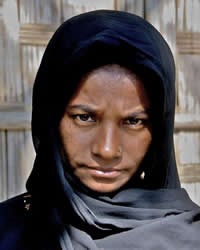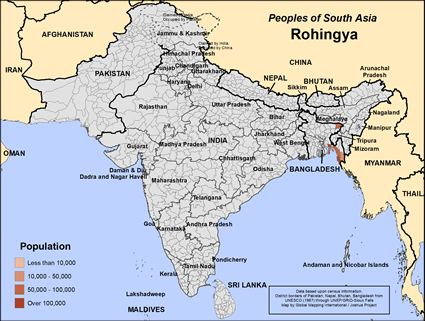In historical perspective Arakan (home of the Rohingya people) is more a frontier province of Eastern India than a province of Burma (now Myanmar). From the very early days till the arrival of the Mongolians and Tibeto-Burmans in the 10th century, Arakan was an Indian land with a population similar to Bengal, with ethnic Aryan people. The spread of Islam in Arakan during those early times and the impact of Islamic civilization on Arakan particularly after Bengal became Muslim in 1203 A.D is well known.
Islam reached Arakan in the late 8th century AD and attracted the local people to convert to Islam en masse. Since then, Islam played an important role towards the advancement of civilization in Arakan. From 1430 to 1638, for more than two hundred years Arakan was ruled by the Muslims. The system of government (Muslim Sultanates) was common in those days. It was an independent Muslim kingdom in the 14th and 15th centuries.
These Muslims have encountered strong pressure from the dominant Buddhist culture, and especially the Myanmar military. The Rohingyas are considered practicing the foreign way of life having no origin in Burma. According to the ruling military the Rohingyas are to adopt and entertain no ideas but those of Burmese race and culture and Buddhism. They have been violently persecuted, and large numbers fled to neighboring Bangladesh, a Muslim dominant country. Bangladesh cannot absorb many refugees. Some Rohingyas have managed to flee from Bangladesh to the United States as political refugees.
In the United States, Rohingyas are in the process of resettling in cities like Chicago and Milwaukee.
Most Rohingyas are recent arrivals in the United States. They are in the process of adjusting to a very difficult language and culture. In some places they are given many resources to re-settle, but in other places they are on their own.
Some are trying to appeal to American government officials to do something about the plight of their people in Myanmar, but there is little the U.S. government can do. Some Rohingya people are being treated for the emotional trauma inflicted on them in Myanmar.
The Rohingya people are Sunni Muslims who believe that the supreme God, Allah, spoke through his prophet, Mohammed, and taught mankind how to live a righteous life through the Koran and the Hadith. To live a righteous life, you must utter the Shahada (a statement of faith), pray five times a day facing Mecca, fast from sunup to sundown during the month of Ramadan, give alms to the poor, and make a pilgrimage to Mecca if you have the means. Muslims are prohibited from drinking alcohol, eating pork, gambling, stealing, slandering, and making idols. They gather for corporate prayer on Friday afternoons at a mosque, their place of worship.
The two main holidays for Sunni Muslims are Eid al Fitr, the breaking of the monthly fast and Eid al Adha, the celebration of Abraham's willingness to sacrifice his son to Allah.
Sunni religious practices are staid and simple. They believe Allah has pre-determined our fates; they minimize free will.
In most of the Muslim world, common people depend on the spirit world for their daily needs since they regard Allah as too distant. Allah may determine their eternal salvation, but the spirits determine how well they live on a daily basis. For that reason, some Muslims appease spirits using charms and amulets to help them with spiritual forces. More orthodox Muslims consider these practices heretical and un-Islamic.
The Rohingyas need healing from the trauma inflicted on them by a wicked government in Myanmar. While dealing with this, they must also learn fluent English and essential job skills in the United States. There is a shortage of American Christ followers who will help them with their practical needs.
Pray for the Lord to shower his abundant mercy on Rohingya people now settling in the United States.
Pray for American Christ followers to reach out to these Muslims with love and compassion.
Pray for the Holy Spirit to work mightily in Rohingya families, blessing them in every way.
Pray for the Holy Spirit to give the Rohingya people a love for God's Word and a desire to spread its influence.
Pray for an unstoppable movement to Christ among the Rohingyas in the US.
Scripture Prayers for the Rohingya in United States.
https://rli.blogs.sas.ac.uk/2022/03/10/rohingya-in-america-the-challenge-of-language-and-culture/
https://www.zakat.org/how-two-midwest-cities-are-handling-rohingya-resettlement
https://reliefweb.int/report/united-states-america/rohingya-resettlement-united-states-welcome-and-significant-step
https://pulitzercenter.org/projects/rohingya-diaspora-us
https://pulitzercenter.org/stories/we-are-rohingya-americans-establishing-relationship-us-officials-advocate-justice-and-peace
| Profile Source: Joshua Project |












